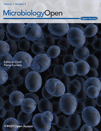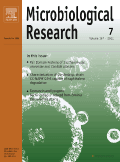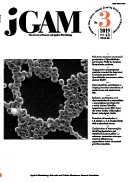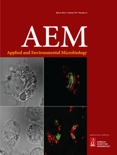
Frontiers in Microbiology
Scope & Guideline
Shaping the Future of Microbial Sciences
Introduction
Aims and Scopes
- Microbial Genetics and Genomics:
Research on the genetic makeup of various microorganisms, exploring their genomic structures, evolutionary patterns, and the implications for pathogenicity and antibiotic resistance. - Microbial Ecology:
Studies focusing on the interactions between microorganisms and their environments, including the dynamics of microbial communities in various ecosystems and their roles in nutrient cycling. - Pathogen Biology and Host Interactions:
Investigations into the mechanisms by which pathogens interact with host organisms, including studies on virulence factors, immune evasion, and disease mechanisms. - Biotechnology and Bioremediation:
Research that applies microbial processes for environmental cleanup, waste management, and the production of bioactive compounds, including the use of microorganisms in biotechnological applications. - Microbiome Studies:
Exploration of the human and animal microbiomes, their implications for health and disease, and how they can be modulated for therapeutic purposes. - Food Microbiology:
Studies on the role of microorganisms in food safety, spoilage, fermentation processes, and the development of novel food products. - Clinical Microbiology:
Research addressing the role of microorganisms in human health, including studies on infectious diseases, antibiotic resistance, and microbial diagnostics.
Trending and Emerging
- Integrative Omics Approaches:
The integration of genomics, transcriptomics, and metabolomics to study microbial communities and their functions in health and disease is increasingly popular, allowing for a more holistic understanding of microbial interactions. - Microbiome-Immune Interactions:
Research exploring the interactions between the microbiome and the immune system, particularly in relation to diseases such as cancer and autoimmune disorders, is gaining attention. - Phage Therapy and Antimicrobial Resistance:
With the rise of antibiotic resistance, studies on bacteriophages as alternative therapeutic agents are trending, focusing on their mechanisms of action and clinical applications. - Microbial Ecology in Climate Change:
Investigations into how climate change impacts microbial communities and their ecological roles are emerging, reflecting a growing concern for environmental sustainability. - Synthetic Biology and Microbial Engineering:
Exploration of synthetic biology techniques to engineer microbes for specialized functions, such as bioremediation or bioproduction, is increasingly prominent. - Microbial Health and Disease Links:
Research linking gut microbiota to various health outcomes, including mental health and metabolic disorders, is expanding, emphasizing the importance of the microbiome in overall health.
Declining or Waning
- Traditional Environmental Microbiology:
Research focusing on classical environmental microbiology, such as basic soil and water microbiology, has decreased as more complex interactions and applications are explored. - Single-Species Pathogen Studies:
Studies that focus solely on individual pathogens without considering their interactions with host microbiomes or ecosystems are becoming less prevalent, with a shift towards more integrative approaches. - Basic Microbial Physiology:
Research centered on fundamental aspects of microbial physiology, such as metabolic pathways in isolation, is being overshadowed by studies that connect these processes to broader ecological and clinical contexts. - Antimicrobial Susceptibility Testing in Isolation:
The traditional focus on susceptibility testing without integrating it with genomic or metagenomic analyses is waning, as researchers seek comprehensive insights into resistance mechanisms.
Similar Journals

MicrobiologyOpen
Fostering innovation and insight in microbiological science.MicrobiologyOpen is a prestigious, open access journal published by WILEY, dedicated to advancing the field of microbiology. Since its inception in 2012, this journal has firmly established itself as a significant platform for researchers, professionals, and students alike, facilitating the dissemination of high-quality research findings across a wide range of microbiological disciplines. With an impressive impact factor and a ranking in the 76th percentile of Scopus for immunology and microbiology, MicrobiologyOpen offers a robust forum for innovative studies, reviews, and compelling insights that push the boundaries of scientific understanding. The journal's commitment to open access ensures that groundbreaking research is freely available to the global community, fostering collaboration and knowledge-sharing. As it continues to evolve until 2024, MicrobiologyOpen remains pivotal for anyone looking to stay at the forefront of microbiological research.

Malaysian Journal of Microbiology
Championing Innovation in Microbiology and BiotechnologyMalaysian Journal of Microbiology is a prestigious open-access journal dedicated to advancing the field of microbiology, published by the Malaysian Society for Microbiology. Since its inception in 2005, this journal has become an essential platform for researchers and practitioners, facilitating the dissemination of innovative studies in applied microbiology, biotechnology, and infectious diseases. Based in Penang, Malaysia, this journal not only focuses on local microbiological research but also positions itself within the broader global scientific community. Although currently placed in the Q4 category in several relevant fields—including Applied Microbiology and Biotechnology, Infectious Diseases, and Medical Microbiology according to the 2023 Scopus rankings—it plays a crucial role in encouraging novel research and fostering collaboration among scientists. The journal encourages submissions that contribute to the understanding of microbial processes, disease mechanisms, and novel biotechnological applications, thereby supporting the continuous growth of knowledge in microbiology. With open access since its launch, the Malaysian Journal of Microbiology ensures that all published works are freely available to the public, enhancing their visibility and impact within the scientific community.

JOURNAL OF MICROBIOLOGY
Pioneering discoveries in applied microbiology and beyond.JOURNAL OF MICROBIOLOGY, published by the Microbiological Society Korea, is a prestigious peer-reviewed journal dedicated to the advancement of knowledge in the fields of microbiology, applied microbiology, and biotechnology. Established in 1996, this journal serves as a vital platform for researchers and professionals from around the globe to disseminate their findings and engage in multidisciplinary discussions pertaining to microbial sciences. With an H-index that reflects its impact, the journal holds a commendable Q2 ranking in key categories including Applied Microbiology and Biotechnology, as well as Medicine (Miscellaneous), which underscores its significance in the academic community. Despite being a subscription-based journal, the JOURNAL OF MICROBIOLOGY aims to contribute to the understanding of microbial processes and their applications, facilitating advancements that are essential in health, industry, and environmental sciences. Researchers, students, and practitioners are encouraged to explore this rich resource for the latest research and trends in microbiology.

MICROBIOLOGICAL RESEARCH
Unveiling Breakthroughs in Microbial ResearchMICROBIOLOGICAL RESEARCH, published by Elsevier GmbH, serves as a leading platform for advancements in the field of Microbiology, holding an impressive Q1 ranking in its category as of 2023. With an ISSN of 0944-5013 and E-ISSN 1618-0623, this journal has been instrumental in disseminating high-quality research since its inception in 1994 and continues to contribute significantly to the academic landscape through 2024. Positioned within the top 13% of publications in the Immunology and Microbiology category, ranked #24 out of 182 according to Scopus, it attracts the attention of researchers, professionals, and students alike. While the journal is not open access, it offers vital insights and peer-reviewed articles that drive innovation and exploration within microbiological research. Its rigorous selection process underscores the importance of quality and relevance in advancing knowledge in this dynamic field.

AIMS Microbiology
Connecting minds to drive breakthroughs in microbiological science.AIMS Microbiology, published by the American Institute of Mathematical Sciences (AIMS), is an esteemed Open Access journal dedicated to advancing the field of microbiology since its inception in 2015. With an ISSN of 2471-1888, the journal aims to disseminate high-quality research and innovative findings pertaining to both fundamental and applied microbiology, encompassing areas such as medical microbiology, immunology, and related life sciences. Recognized for its academic rigor, AIMS Microbiology has achieved a significant standing, evidenced by its current Q2 ranking in both Microbiology and Medical Microbiology categories, along with impressive percentile rankings within prestigious Scopus metrics. Based in the United States, the journal not only emphasizes accessibility and widespread dissemination of knowledge but also plays a crucial role in fostering collaboration among researchers and professionals in the microbiological sciences. By providing a platform for collaborative research and innovative ideas, AIMS Microbiology is poised to influence the future development and application of microbiological research, making it a valuable resource for students, researchers, and practitioners alike.

JOURNAL OF GENERAL AND APPLIED MICROBIOLOGY
Innovating biotechnology through rigorous microbial research.JOURNAL OF GENERAL AND APPLIED MICROBIOLOGY, published by the MICROBIOL RES FOUNDATION, is a vital resource in the fields of applied microbiology and biotechnology, as well as in diverse medical applications, serving an academic community dedicated to advancing microbial science. Established in 1955, this journal has a rich history of disseminating innovative research and insights into the intricate world of microorganisms. With an ISSN of 0022-1260 and an E-ISSN of 1349-8037, the journal maintains high scholarly standards and robustness, reflected in its 2023 Scopus rankings placing it in the Q3 and Q4 quartiles within its categories. While primarily based in Japan, the journal engages a global audience, offering valuable contributions that inform both theoretical perspectives and practical applications in microbiology. Despite being a non-open-access publication, it provides pivotal research findings essential for academics, professionals, and students alike, fostering a deeper understanding of microbial impact on health and the environment.

mLife
Exploring the unseen world of microbes, one discovery at a time.Welcome to mLife, an emerging journal at the forefront of microbiological research published by the esteemed WILEY in China. With its ISSN 2097-1699 and E-ISSN 2770-100X, mLife serves as a vital platform for scholars and practitioners aiming to advance their understanding of microbial sciences. With an impressive Q2 ranking in the Microbiology category and a Scopus rank of 143 out of 182, mLife is quickly establishing itself as a valuable source of cutting-edge research. The journal, covering a range of innovative topics from immunology to environmental microbiology, provides an engaging venue for disseminating high-quality research findings aimed at addressing real-world challenges. Authors and readers alike benefit from its accessibility features that encourage scholarly collaboration and information sharing. As we converge on the rich microbial landscapes from 2022 to 2024, mLife is committed to fostering a community dedicated to rigorous research and impactful discoveries.

APPLIED AND ENVIRONMENTAL MICROBIOLOGY
Unveiling the Secrets of Microbial Interactions in Our WorldApplied and Environmental Microbiology, published by the American Society for Microbiology, stands as a leading journal in the fields of applied microbiology and environmental science since its inception in 1976. With a prestigious Q1 quartile ranking across multiple categories including Applied Microbiology and Biotechnology, Ecology, and Food Science, this journal consistently disseminates high-impact research that drives innovation and advances our understanding of microbial interactions within our ecosystems and industries. As ranked by Scopus, it exhibits prominent rankings in various related fields, underscoring its critical role in shaping contemporary microbiological research. Researchers, professionals, and students alike can stay abreast of groundbreaking studies while contributing to a vast body of knowledge that spans diverse aspects of microbiology, biotechnology, and ecology, ultimately contributing to sustainable practices. Join the community of dedicated scholars and explore vital research findings that impact both environmental health and technological advancement.

Microbiology Research
Transforming Microbiology Through Open Access KnowledgeMicrobiology Research, published by MDPI, stands as a pivotal open-access journal in the field of microbiology, having established its presence since 2010. Based in Switzerland, this journal strives to provide a platform for innovative research and cutting-edge findings in various branches of microbiology, including medical microbiology and molecular biology. With an impact factor that reflects its dedication to scholarly excellence, Microbiology Research is classified in the Q3 category for both microbiology and medical microbiology, and Q4 for molecular biology as of 2023, indicating its growing importance and outreach within these domains. The journal aims to foster discussion and collaboration among researchers, professionals, and students by presenting articles that cover a wide array of topics and methodologies in microbiological research. Leveraging its open-access model, Microbiology Research ensures that high-quality research is accessible to a global audience, thus facilitating the advancement of knowledge and innovation in the microbial sciences.

LETTERS IN APPLIED MICROBIOLOGY
Elevating Knowledge in Applied MicrobiologyLETTERS IN APPLIED MICROBIOLOGY, published by OXFORD UNIVERSITY PRESS, is a prominent journal in the field of applied microbiology, serving as an essential platform for researchers and professionals to disseminate innovative findings. With an ISSN of 0266-8254 and an E-ISSN of 1472-765X, this peer-reviewed journal has been contributing to the scientific community since 1985 and continues to engage with cutting-edge research through 2024. With its current Scopus ranking placing it in the 45th percentile of its category, specifically at rank #70 out of 127 in the Applied Microbiology and Biotechnology field, it underscores its significance in advancing knowledge and applications pertinent to microbial science. Although it is not open access, LETTERS IN APPLIED MICROBIOLOGY offers comprehensive insights aimed at enhancing the understanding of microbiological phenomena in practical scenarios, making it a valuable resource for both seasoned experts and emerging scholars.